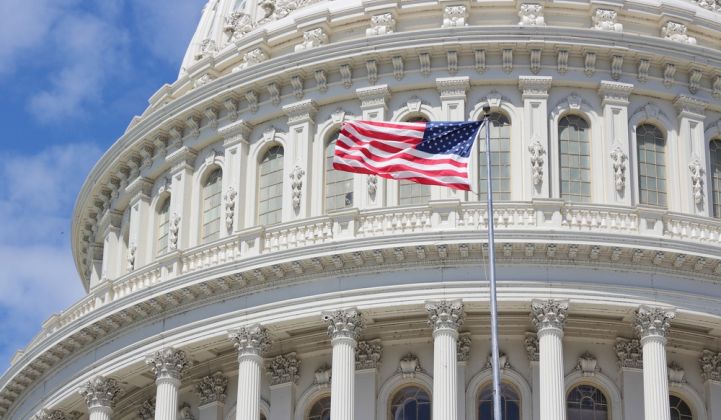Democratic candidates Rev. Raphael Warnock and Jon Ossoff clinched victories in Georgia’s Tuesday runoff races for the U.S. Senate, according to the Associated Press, giving Democrats control of both chambers of Congress as President-elect Joe Biden enters office.
The final results of the runoff election came amid chaos in Washington, D.C., as a violent, pro-President Trump mob stormed the U.S. Capitol in an attempt to dispute the results of the presidential election. Several lawmakers, sheltering in the Capitol, described the actions as a coup attempt.
The outcome of the election in Georgia determines the extent to which Congress can support the policy priorities of President-elect Joe Biden in the first two years of his administration. On clean energy and climate change, Biden’s pledge to work toward 100 percent clean electricity nationwide by 2035 and invest $2 trillion in the energy transition will still be challenging to accomplish, as Democrats do not have a filibuster-proof majority.
But Tuesday’s results open the door for more ambitious action from Congress, including possible incentives for renewables and legislation on energy infrastructure.
Warnock's and Ossoff’s wins leave both Democrats and Republicans with 50 seats in the Senate, with incoming Vice President Kamala Harris able to break ties. Avoiding a filibuster in the Senate, which allows the minority party to block moving forward on legislation, requires 60 votes.
It is possible that the Senate could eliminate or weaken the filibuster, which would make it easier to pass more ambitious legislation on issues including climate (and COVID-19 relief). But lawmakers may not have the appetite to do that.
Sen. Joe Manchin of West Virginia, a Democrat who will now chair the Senate Energy and Natural Resources Committee, has said he does not favor eliminating the filibuster. Manchin, who favors "all-of-the-above" energy policy, also voted “no” on the Green New Deal.
Congress could also consider climate and clean energy action through the budget reconciliation process, which allows for a majority-only passage of spending-related measures — which could include provisions such as a green bank or the renewable tax credits that Congress recently extended.
A clean energy standard could also fit into that framework, according to Leah Stokes, an assistant professor of political science at the University of California, Santa Barbara.
“An ambitious [clean electricity standard] is very much doable with Democratic control of the Senate, and it must be a priority,” Stokes said in an email. “Biden ran and won on this agenda. There is a clear mandate for Congress to act on a 100 percent clean electricity standard by 2035.”
With a majority, Democrats will be able to more easily confirm Biden picks for his cabinet, the Federal Energy Regulatory Commission — which could shift to Democratic control this summer as Commissioner Neil Chatterjee’s term ends — and courts, where Republican states may challenge new environmental regulations.
Current Senate Majority Leader Mitch McConnell holds significant power in determining which policies get consideration by the full Senate, evidenced most recently by his unwillingness to call a vote on providing some in the U.S. with $2,000 stimulus checks. With Democratic Minority Leader Sen. Chuck Schumer soon assuming that position, bipartisan policy including support for clean energy may get more traction.
Both Warnock, a pastor at Ebenezer Baptist Church in Atlanta, and Ossoff, a media executive, support certain actions on climate change that Biden has promised, including rejoining the Paris climate agreement and undoing the environmental regulation rollbacks of the Trump administration.
Outside of congressional action, Biden has already promised to rely in part on executive authority to pursue climate and clean energy policies. Without help from Congress, Biden’s administration can streamline permitting for renewables on federal land and waters, draw on $40 billion in loan guarantees available through the Department of Energy, enact new regulations under the Clean Air Act and require companies to disclose more details about financial risks related to climate change, among other possible tools.
The president-elect may also rely on deficit spending for energy and climate programs, in lieu of undoing the tax cuts passed during Trump’s presidency, which would require congressional support.




